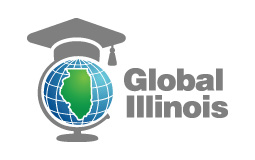
Global Scholar Committee Process
A primary function of the Global Scholar Committee (GSC) is to evaluate existing programs and curricula to ensure that students are able to meet requirements for the Illinois Global Scholar Certificate. This means that members of the GCS must conduct an audit of current courses and opportunities available to students and, if necessary, adjust or add new courses or opportunities. The Global Scholar Committee must also determine the best pathway for students to complete the Illinois Global Scholar Performance-based Assessment. Below are the four requirements students must complete to receive the Illinois Global Scholar Certificate along with parameters established by the Illinois State Board of Education.
- The course must be rooted in the Four Domains of Global Competence and require that students
- Investigate the world
- Recognize their own perspectives and the perspectives of others
- Communicate ideas with diverse audiences
- Provide opportunities to take action to improve conditions in a manner consistent with the learning standards adopted by the State of Illinois.
- The course must address world issues, perspectives, concerns, or culture throughout the duration of the course in sufficient depth and breadth.
- Courses likely to have Global Focus. The following list of commonly-taught courses are likely to be designated as globally-focused:(1) World languages (2) International economics, international business, or global marketing (3) World history/non-U.S. history (4) World geography (4) Comparative cultures, comparative religions, comparative government (5) Science, technology, engineering, and math (STEM) courses with global application/perspective (6) International relations or foreign relations (7) Literature of another country, region, or culture (8) International agri-science or agriculture
- Breadth. Courses that employ a global focus or address global topics in some units but not others are not sufficient to be deemed globally-focused courses, nor are courses that survey global arts, foods, or music without at least ⅓ of class time being devoted to the investigation/research into global phenomena, and/or assessment of the global and cultural context from which the phenomena arise.
- Depth.Though high schools offer some or many of the courses listed above as “likely to be globally-focused”, the courses and subject areas listed above are not the only courses that may qualify as globally-focused. Other courses, such as those in family consumer science, the arts, mathematics, health, and agricultural science, may also qualify, provided that an appropriate depth of knowledge of, and inquiry about, global issues and diversity is incorporated. The examples identified in the following chart, though not exhaustive, are provided to give guidance to school districts and GSCs seeking to determine if a course investigates the world.
|
Table 1: Examples of Courses with Insufficient and Sufficient Depth |
||
| Course | Insufficient Depth | Sufficient Depth |
| Music, Drama, or Visual Arts | Students create an artistic piece or performance inspired by another culture. | Students interpret, create, and/or evaluate a global issue through an artistic medium. |
| Foods or Culinary Arts | Students prepare food from another part of the world or another culture. | Students prepare food from another part of the world or another culture and consider the production and preparation of food in relation to local cultures, health, sustainability, etc. |
| Mathematics | Students use datasets from another country or culture to illustrate a concept. | Students evaluate and use appropriate mathematical tools to investigate a global issue OR derive additional information using mathematical methodologies. |
| Agricultural Science | Students use examples of agricultural management, finance, marketing, and/or the foundations of crop and livestock production in a unit on the global marketplace. | Students learn about agricultural management, finance, marketing, and the foundations of crop and livestock by comparing a variety of agricultural practices found around the world and examine the complex global interrelationships that exist among the global agricultural industry. |
| Health | Students learn about epidemics/disease, health care practices, and/or prevention measures through cases studies in other parts of the world. | Students learn about global epidemics/disease, health care practices, and prevention measures through a comparative epidemiologic analysis incorporating diverse global contexts. |
Contact [email protected] if you would like to receive a worksheet to help the Global Scholar Committee determine courses with a global focus.
- The activity or experience must be tied to tied to globally-focused coursework, co-curricular activities oriented toward global service, and/or the student’s Global Scholar Performance-based Assessment.
- The activity or experience must be consistent with the definition of service learning in that the activity or experience must:
- actively engage and educate the student within the local community in meaningful, globally-focused service activities that promote understanding of diversity and mutual respect among all participants
- allow the student to be self-directed in initiating, planning, implementing, and evaluating throughout the experience
- are designed with sufficient duration and intensity to address community needs within a global context
- engage participants in an ongoing process to assess the quality of implementation and progress toward meeting specified goals, and use of the results for improvement and sustainability; and
- incorporate multiple reflection activities that challenge students to think deeply about the relationship of self, society, and the world.
- Students participate in the globally-focused service learning experience or activity for a minimum of one semester.
- Service learning activities and experiences must align with State and district learning standards, as well as curricular goals and objectives of the school district.
Contact [email protected] if you would like to receive a worksheet to help the Global Scholar Committee determine qualifying globally-focused service learning opportunities.
Students seeking the Illinois Global Scholar Certificate must participate in global collaboration or dialogue. This requirement can be met in one of the following ways:
- A field experience in another country specifically designed to facilitate global dialogue or collaboration among peers (e.g., a class trip to a sister school in another country, participation in government, or funded study abroad program)
- Virtual experiences specifically designed to facilitate global dialogue or collaboration among peers.(e.g. co-blogging, Skype in the Classroom, Global Nomads, or Generation Global)
- Culturally-immersive service or learning experiences that engage students in a domestic or local cultural context markedly different from the global scholar’s cultural context (e.g., a refugee community)
The Global Scholar Committee, in collaboration with educators and students is responsible for ensuring that these experiences meet the following qualifications:
- Students must dialogue or collaborate with global peers whose culture is markedly different than their own.
- The global collaboration or dialogue experiences must offer students opportunities to:
- demonstrate the communication skills necessary to work effectively and respectfully with and within diverse teams
- exercise flexibility and willingness to be helpful in making necessary compromises to accomplish a common goal; and
- to assume shared responsibility for collaborative work and value the individual contributions made by each team member.
- Creating and maintaining a list of recommended global collaboration and dialogue opportunities approved by the district. A list of global collaboration opportunities can be found here.


